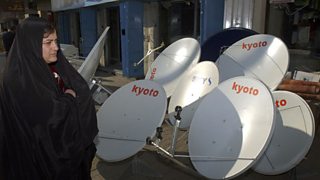Ten years on, the US-led coalition's decision to invade Iraq continues to polarise opinion. Iraq's transition from dictatorship to functioning democracy was never likely to be smooth, but a decade of terrible violence has exacted a huge toll. The country remains divided on ethnic and religious lines, while the threat of disintegration and sectarianism have not evaporated. Good news often seems hard to come by.
Over the last few months, 主播大秀 Media Action has been analysing just one aspect of Iraq's journey – that of its media – for a that has been released today. Perhaps more than any other sector, Iraq's media is entirely unrecognisable from the days of Saddam Hussein. It seems incredible to think that only a decade ago, satellite dishes were banned in Iraq and mobile phones and the internet unknown. There was no non-state media. Iraqis were essentially cut off from the outside world.
Today, Iraq has a diverse non-state media sector, with 30-40 satellite stations specifically catering to Iraqis, and countless radio and print sources. Nearly all households have access to the Iraqi satellite stations, as well as a range of other Arabic television.

Iraqis have their own views on the successes and the failures of the last decade. When looking at the media sector, the greatest gain is surely that Iraq's televisions now display the diversity present in Iraqi society that was so ruthlessly airbrushed out by Saddam’s regime. Importantly, this diversity seems like it is here to stay.
On the downside, the channels that have sprung up are overwhelmingly partisan. Despite huge oil wealth, Iraq's private sector remains weak and insufficient for the media to survive off commercial revenue alone. As a result, sources of funding can be murky. Most channels are supported through the funds of political parties, religious and ethnic groups, and also those from outside with an interest in Iraq. Saudi Arabia, Qatar and Iran are believed to provide significant funding, and this is unlikely to change any time soon.
But it is easy to overlook the progress that has been made. In addition to a boom in non-state media, Iraq has the only constitutionally-protected independent regulatory authority in the Arab world. What's more, the laws governing the state broadcaster do provide the potential for it to become independent of the government’s grip.
Nevertheless, as our illustrates, there is no escaping the fact that the past still has a very real impact on the sector. The broadcast media was, from the outset, seen as a tool of state control in Iraq. And its use, as such, continues to colour Iraqis' expectations of the media and the perception of its role. The government still sees the state broadcaster as its voice, just as it perceives the non-state channels to be the voices of its opponents. Objectivity is not a goal that is frequently sought.
Changing these expectations will undoubtedly take time – probably a few more decades – and no small amount of effort. The need for legal and regulatory reform in order to translate the liberal tenets of Iraq's 2005 constitution into reality is urgent. But at least the news is not all bad.
Related links
